Content
- 1 The best varieties of medium-sized tomatoes for greenhouses
- 2 Varieties for greenhouse gardens
- 3 Variety of varieties: how to choose the right one?
- 4 Seed selection criteria and rules
- 5 Low-growing varieties of tomatoes for growing in the open field
- 6 Medium-sized varieties of tomatoes for open ground
- 7 Varieties that differ in the original color and shape of the fruit
- 8 Greenhouse varieties
- 9 The best varieties of tomatoes (video)
- 10 Disease Resistant Tomatoes
- 11 Gallery: tomatoes for open ground and greenhouses (15 photos)
- 12 How to choose a variety
- 13 Video "Overview of many varieties of tomatoes"
- 14 The best tomatoes
- 15 Video "A selection of the most popular varieties"
If your greenhouse does not exceed 170-180 cm in height, then the choice of a suitable variety is limited. What varieties of tomatoes are best planted in a greenhouse in this case? Tall indeterminate varieties are not suitable due to lack of volume for growing bushes. Stunted ones will not allow full use of the available height. But medium-sized tomatoes with a height of 100-180 cm will be ideal for planting.
The best varieties of medium-sized tomatoes for greenhouses
Among medium-sized tomatoes, you can find any necessary options - tomatoes of different sizes, colors and purposes. The best of them also have good yields and resistance to several common crop diseases.
Red varieties of medium-sized tomatoes
The classic red color of tomatoes is included in the planting plan by almost all summer residents. For low greenhouses, you can choose one of the following varieties:
- Blagovest F1... An early ripe hybrid grows 150-180 cm, and bears fruit in 101-105 days. The plant will need to be formed into one or two stems. Rounded red fruits weighing 100-110 g are suitable both for a fresh table and for canning with whole tomatoes. Cladosporium, Fusarium or TMV are not terrible for this variety. Up to 5.5 kg of fruit can be harvested from one plant.
- Budenovka... The bushes of this indeterminate variety grow up to 150 cm in height. The plant is medium early, ripening occurs in 111 days. Fruits of a beautiful heart-shaped shape have a weight in the range of 150-350 g. They have a very tasty and juicy pulp with a high sugar content. Tomatoes are used in salads and canned in slices. The plant needs a garter and shaping. The yield reaches 9.3 kg / m2.
- Bull heart red... A popular variety both in open beds and in greenhouses. Low-leafed bushes grow up to 150 cm, and they can be harvested in 120-130 days. The variety is valued for its large, heart-shaped, small-seeded fruits, very tasty and fleshy. The first fruits are harvested weighing up to 400 g, followed by about 200 g. Tomatoes of this variety are used as salad and for canning in pieces.
- Virtuoso F1... A mid-early hybrid grows up to 150-180 cm, ripe fruits can be harvested in 106-110 days. The plant is generative, it should be formed into one stem.Red rounded fruits weighing 160 g do not crack, are suitable for canning and salads. The variety is perfectly adapted to changes in temperature and humidity, resistant to major lesions. 6.5-7 kg of tomatoes are usually harvested from the bush.
- Courchevel F1... A hybrid with powerful bushes up to 150-180 cm, which need pinching and garter. Maturation occurs in 100-110 days. Leveled fruits weighing 140-160 g are resistant to cracking, suitable for salads, canning, juicing and freezing. The variety is not susceptible to pathogens of TMV, Fusarium, Cladosporium. Each bush can be harvested 6.5-7 kg of fruit.
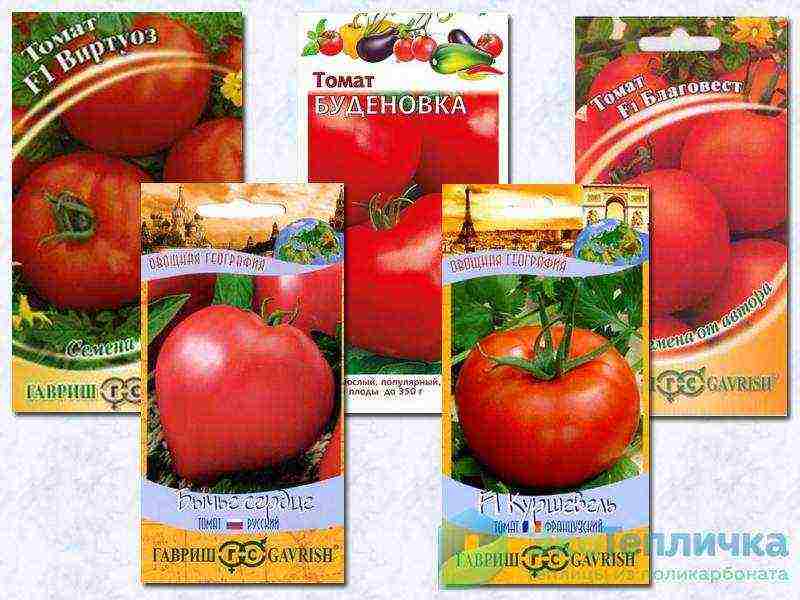
Medium-sized varieties of pink tomatoes
For lovers of pink tomatoes, we suggest planting a low variety with fruits of excellent taste in the greenhouse. You can choose one of the following:
- Banzai... This variety can be planted close to low walls, because the bushes grow no higher than 100 cm.The plant is formed into two or three stems. The variety needs regular watering, is extremely picky about soil moisture. With proper care, you will get very tasty, fragrant, with tender pulp, fruits weighing about 160 g. Productivity is 3 kg from one bush.
- Bull heart pink... A productive variety with a low-leafed bush height of 150 cm. Fruiting should be expected in 120-130 days. Large, heart-shaped fruits of a bright raspberry hue are valued for their excellent taste, fleshiness, and a small amount of seeds. The first ripe tomatoes can reach 400 g by weight, the next - about 200 g. Tomatoes are used mainly in salads, and can also be canned by cutting into pieces.
- Pink... If you need the best varieties of pink tomatoes for greenhouses that are not affected by late blight, then feel free to choose Pink, which ripens in 90-95 days and gives off the harvest almost completely in the first month. Late blight simply does not have time to develop by the time of fruiting. The bush grows up to 150 cm. Fruits are tied with 6 tassels. rounded tomatoes weighing 120-125 g are appreciated for their excellent taste, used in salads and for canning. Productivity 3-4 kg from each plant.
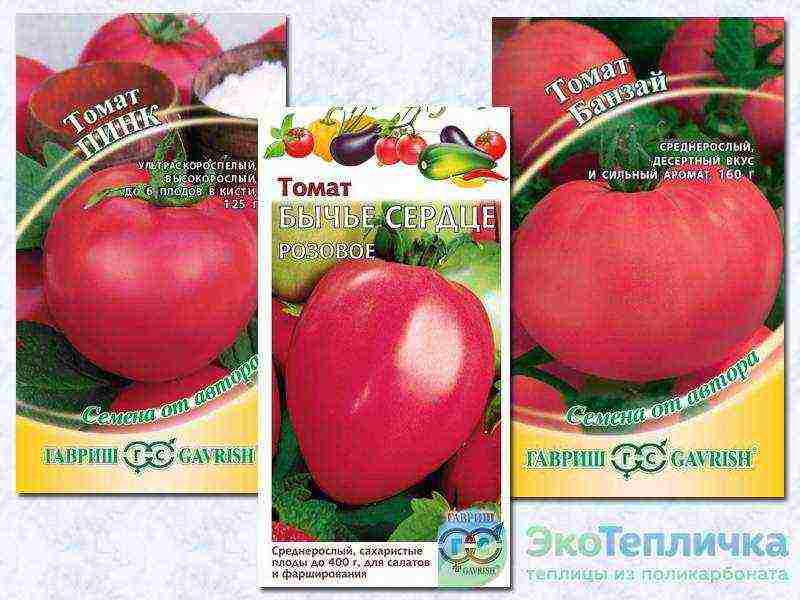
Yellow medium-sized tomatoes for greenhouses
Yellow tomatoes not only cheer you up with their color, but also have a beneficial effect on health. They are hypoallergenic, improve digestion, and have a beneficial effect on the kidneys and liver. Of the medium-sized tomatoes, the following varieties deserve special attention:
- Persimmon... A mid-season variety grows up to 70-100 cm and bears fruit for a long time. If you regularly feed the bushes, and remove the fruits in blanche ripeness with ripening in the plucked form, then the yield reaches 3 kg from each bush. A salad variety with delicate golden-orange large fruits, the weight of which can reach 300 g. There is a lot of carotene in the pulp.
- Yellow giant... The plant grows up to 140-150 cm and belongs to the best varieties of yellow tomatoes for greenhouses in terms of yield. 10-11 kg of large ribbed fruits with a rich sweetish taste can be removed from the bush. Tomatoes weigh up to 700 g. Their tender fleshy pulp is used for salads and canning in the form of pieces. Maturation occurs in 100-105 days. Requires pinching, garter stems.
- Fig yellow... This mid-early new variety is appreciated for its particularly tasty and aromatic fruits with juicy sugar pulp. Ribbed fruits, weight 200-250 g. Used for salads, juices, canning. Disease resistance is complex. The plant is formed into one stem by transferring the growth point to the stepson.
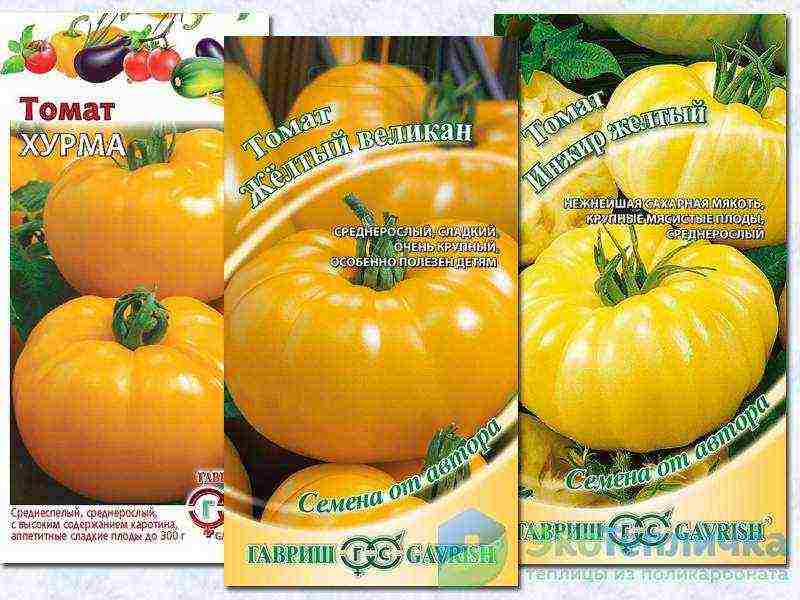
Medium-sized varieties with original tomato color
If you are thinking about what varieties of tomatoes for a greenhouse will look especially impressive when freshly cut and in winter preparations, then choose tomatoes with an unusual color of the fruit. Moreover, among the medium-sized ones there are many varieties of unusual color with good yield and taste. We propose to evaluate the following developments of breeders:
Frog princess... Ripe flat-round fruits of this variety are emerald green with a slight bronze tint. The bushes are powerful, up to 150 cm. Ripening occurs after 11-115 days. Large, slightly ribbed fruits have an exquisite taste, and the average weight is 250 g. The purpose is universal: fresh table, canning, home cooking. The yield of the variety is up to 6.5 kg / m2.
Tiger... Small rounded fruits (30-50 g) of very unusual color with yellow stripes on a bright red background. The bushes grow up to 150 cm, the plant bears fruit after 110-120 days. Ripe tomatoes can be used in salads, for freezing and canning. The yield of the variety is 4.5-5 kg / m2.
Striped flight... Another original variety with striped small fruits (30-40 g), but already with green stripes on the background, which changes from red-brown to pink as it ripens. The bushes are fruitful, literally sprinkled with tomatoes. Dense fruits keep their shape perfectly when canning and retain their elasticity. The taste is excellent when fresh and salty.
Black moor... Clustered tomato is one of the best varieties of black tomatoes for a greenhouse in terms of a set of indicators: it is very productive (up to 6 kg per bush), universal purpose, perfectly transported, excellent taste and shape. On each hand, up to 18 fruits weighing 40-50 g are tied. Ripening occurs no later than 115 days. Plum tomatoes, brown-brown, dark spot on the base. The pulp is dense, juicy, fleshy, sweet taste.
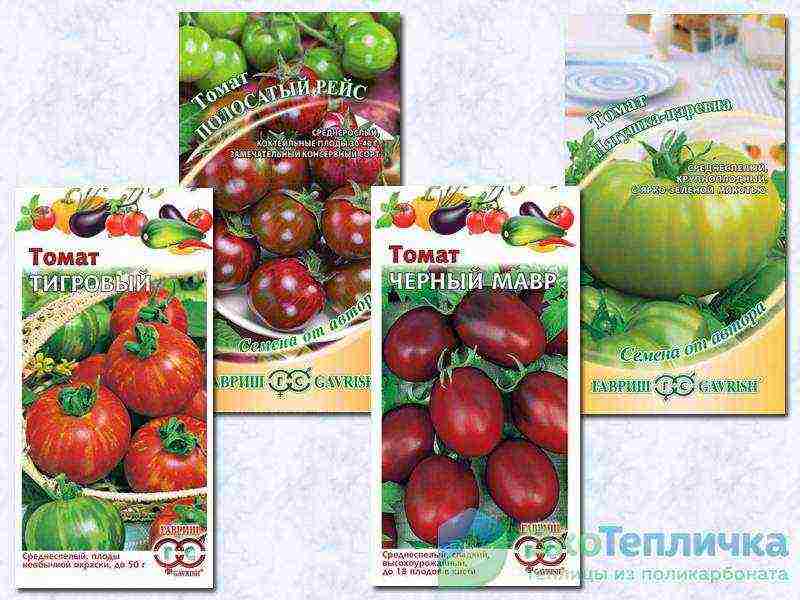
Among medium-sized tomatoes, there are enough original and productive varieties with an excellent taste to draw up an optimal planting plan for a low greenhouse of any size and shape.
Cultivation of tomatoes in a greenhouse is fraught with a number of difficulties; agricultural techniques are also different from the usual ones carried out for tomatoes. Not only plants require a more "high-tech" approach, the greenhouse also needs to be looked after: change the soil every two years, cover on too hot days, remove snow "caps" in winter. But the harvest obtained in the greenhouse is many times higher than the indicators of tomato cultivation in the open field. In addition, there are greenhouse varieties of tomatoes that simply cannot be grown without a greenhouse shelter.
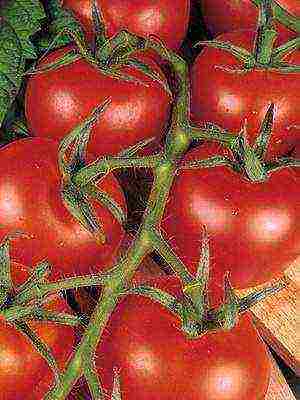
Varieties for greenhouse gardens
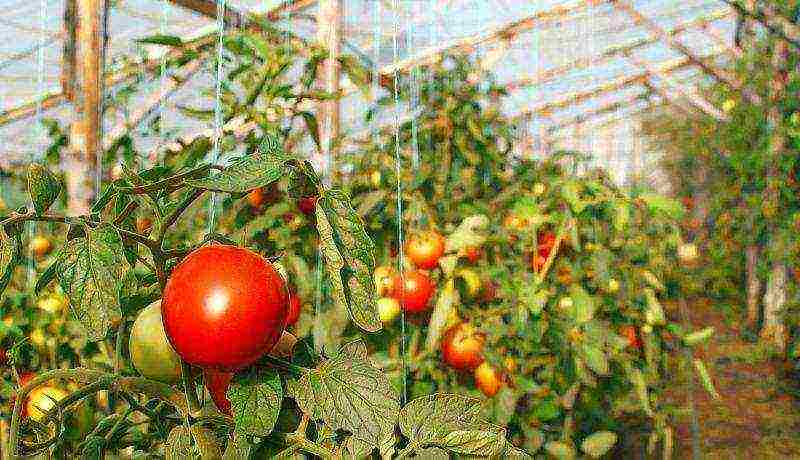 In many ways, it is good varieties of tomatoes for greenhouses that determine half of the success. Select them for the greenhouse should be as careful as for uncovered ground. After all, the variety of tomatoes bred to date is simply amazing. Every year, new varieties of tomatoes for greenhouses appear, designed for one or another growing purpose.
In many ways, it is good varieties of tomatoes for greenhouses that determine half of the success. Select them for the greenhouse should be as careful as for uncovered ground. After all, the variety of tomatoes bred to date is simply amazing. Every year, new varieties of tomatoes for greenhouses appear, designed for one or another growing purpose.
Variety of varieties: how to choose the right one?
First of all, when choosing tomato varieties for greenhouses, you need to take into account their dimensions. According to the type of growth, all tomatoes are divided into: indeterminate, semi-determinant, determinant. If we translate these terms into a more familiar language - tall, medium-sized, short.
Indeterminate varieties - most suitable for greenhouses
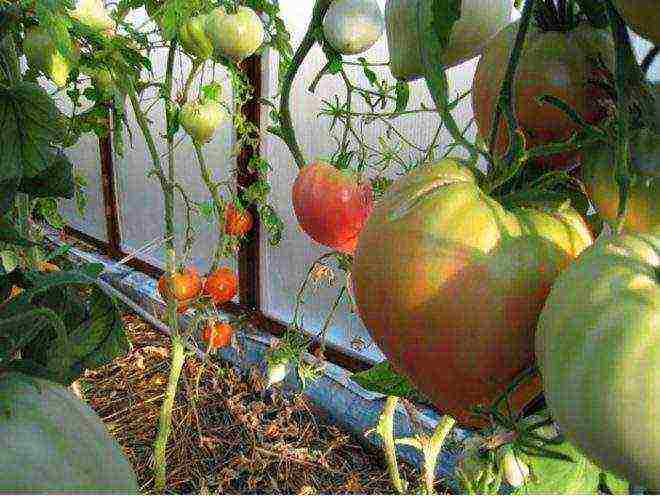 If the greenhouse is spacious and tall, then it is better to opt for indeterminate varieties. Indeterminate tomato is a plant with unlimited growth, reaching 1.6-2 meters (sometimes even higher). Caring for such tomatoes is more difficult, since they have to be tied up and the side stepchildren have to be tied up and removed from the bush, but they also give a higher yield - 40-50 kilograms per 1 sq.
If the greenhouse is spacious and tall, then it is better to opt for indeterminate varieties. Indeterminate tomato is a plant with unlimited growth, reaching 1.6-2 meters (sometimes even higher). Caring for such tomatoes is more difficult, since they have to be tied up and the side stepchildren have to be tied up and removed from the bush, but they also give a higher yield - 40-50 kilograms per 1 sq.
Sometimes varieties with high growth are planted together with medium-sized ones so that the yield of the harvest goes on continuously. In this case, semi-determinant varieties are planted along the walls of the greenhouse, and taller indeterminate tomatoes are placed in the center - along the path. At the same time, it is important to leave a distance between medium-sized bushes - 30-40 cm, and tall ones - 50-60 cm. It is not recommended to plant tomatoes too densely in the garden. A large amount of foliage will shade the neighboring plant, create excessive moisture, which tomatoes do not like.In addition, excessive moisture in the air and soil is a favorable environment for the development of all types of rot, which so often bother tomatoes.
The best representatives of indeterminate varieties for greenhouse gardens
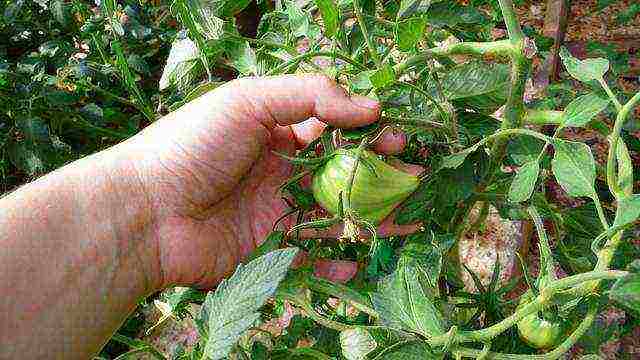 Speaking about which varieties of tomatoes are the most productive for greenhouses, the first thing to say is indeterminate. They are larger-fruited, their top is constantly growing, throwing out more and more new inflorescences that set fruits over time, so the yield at the exit is large.
Speaking about which varieties of tomatoes are the most productive for greenhouses, the first thing to say is indeterminate. They are larger-fruited, their top is constantly growing, throwing out more and more new inflorescences that set fruits over time, so the yield at the exit is large.
In practice, it has been proven that the best varieties of tomatoes for greenhouses are indeterminate and large-fruited, consistently yielding. These include the following representatives: Bull heart, Abakan pink, Bovine heart, King orange, Lopatinskie, Pink elephant, Dvukolor, De Barao. Reading reviews about the best tomatoes for the greenhouse, all of them can be found in the ranking of the most fertile.
De Barao is a multiple tomato champion
An excellent answer to the question: which tomatoes are the most productive and unpretentious for greenhouses will be the De Barao variety. He has long won the first place among indeterminate tomato varieties. Since the nineties of the last century, this variety has been cultivated in almost all regions of Russia. De Barao is a variety embodied in many different varieties: Gold, Black, Royal, Pink, Red, Orange. This variety, as strange as it may sound, is devoid of negative qualities: easy to care for, long fruiting period, resistant to frost, diseases and pests, can grow in shaded areas.
The variety belongs to the carp, which significantly increases its yield. Indeed, from 5 to 10 tomatoes are formed on one bunch. The fruits themselves are oblong, weighing ≈100 grams each. The colors are varied: yellow, red, crimson, pink, black, orange. The color scheme is determined by the selected variety. Tomatoes are characterized by a dense pulp structure, which prolongs their keeping quality. They are used for a variety of purposes - in fresh salads, in everyday recipes, in pickling and pickling. The only thing that you can "find fault with" is the high growth of De Barao. On average, its height reaches 2 meters, but it can also exceed this mark, reaching three to four meters. This variety is a great option for novice gardeners and gardeners.
Semi-determinant tomato varieties
The role of the "partner" of indeterminate tomatoes in greenhouse conditions is often performed by semi-determinant varieties of tomatoes, they are slightly lower in growth.
If the average growth of indeterminate tomatoes is about two meters, then for medium-sized tomatoes this mark is maximum. Basically, the average height of semi-determinant varieties is 1.5 -1.8 m. They are chosen not only because of their growth, they give a harvest ten to twelve days earlier than their "tall brothers".
The best representatives of semi-determinant varieties for greenhouse gardens
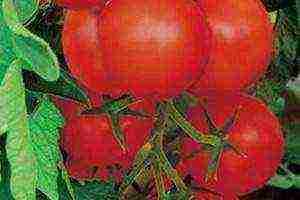 The best medium-sized representatives were recognized greenhouse tomatoes of the following varieties: Baron F1, Kupets F1, Gravitet F1, Silhouette F1, Magnus F1, Khlynovsky F1, Ivet F1, Krasnaya Arrow F1. These are unusually fertile varieties that bear fruit in a short time.
The best medium-sized representatives were recognized greenhouse tomatoes of the following varieties: Baron F1, Kupets F1, Gravitet F1, Silhouette F1, Magnus F1, Khlynovsky F1, Ivet F1, Krasnaya Arrow F1. These are unusually fertile varieties that bear fruit in a short time.
Judging by the alphanumeric designation, all these tomatoes belong to hybrids (F1 stands for hybrid). Most often, modern farmers make a choice in favor of hybrids, since they are more productive and disease-resistant. Only well-proven varieties can replace hybrid plants. In the case of semi-determinant varieties, this includes the Eagle's Beak variety.
Tomato Eagle Beak
This bright tomato is a newcomer to the market of planting material, but has already taken a leading position. The variety was bred by domestic breeders and in the best way represents large varieties of tomatoes for Siberia in a greenhouse: resistant to numerous frosts in spring and a small amount of light in summer.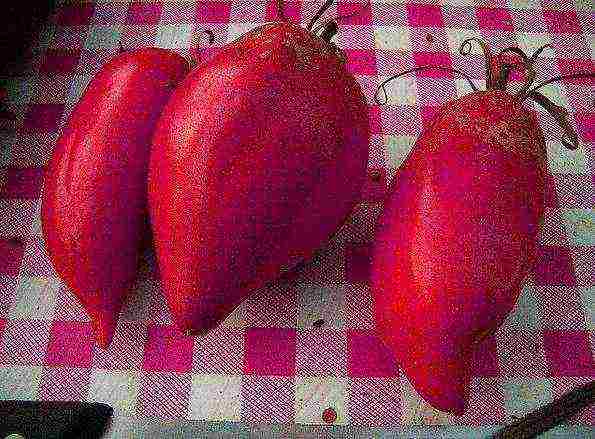
Its fruits are difficult to confuse with other tomatoes.Elongated, with a pointed end, slightly curved downward, they really look like an eagle's beak. The bright crimson color of tomatoes only improves their appearance, making them unusually attractive. The height of the bush is average - 1.5 meters, the yield is high - 10-15 kg / sq.m. Juicy raspberry tomatoes, very tasty, large. The weight of one tomato harvested at the beginning of fruiting is up to 800 grams, then the weight is reduced to 400 grams. The pulp is very sweet and juicy. Eagle's beak tomatoes do not deteriorate for a long time and retain their visual appeal well during storage. According to their intended purpose, they are included in the category of salad varieties and it is best to eat them fresh or squeeze juices from them, as well as prepare tomato paste. They are of little use for canning, since large fruits run the risk of not fitting into the jar. This variety also has disadvantages regarding greenhouse cultivation. It does not belong to a self-pollinating species, so pollination will become an additional item in plant care.
Determinant varieties - the best option for cold regions
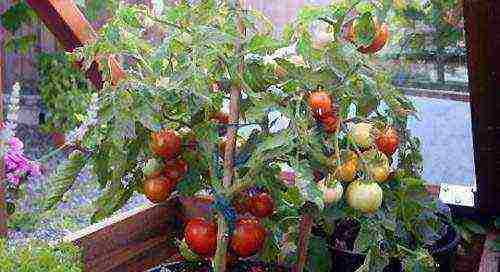 When asked which tomatoes are best planted in a greenhouse, many experienced gardeners recommend low-growing varieties. Determinant tomato varieties for the Urals best tolerate even the most difficult conditions in cold regions. The most suitable tomato varieties for the Urals in the greenhouse: Adeline, Iceberg, Arctic rose, Fighter (another name is Buyan), Top ten, Mongolian dwarf, Generator F1, Nikola, Little Red Riding Hood, Labrador, Lagidny, Pride of Siberia, Monk.
When asked which tomatoes are best planted in a greenhouse, many experienced gardeners recommend low-growing varieties. Determinant tomato varieties for the Urals best tolerate even the most difficult conditions in cold regions. The most suitable tomato varieties for the Urals in the greenhouse: Adeline, Iceberg, Arctic rose, Fighter (another name is Buyan), Top ten, Mongolian dwarf, Generator F1, Nikola, Little Red Riding Hood, Labrador, Lagidny, Pride of Siberia, Monk.
Mongolian dwarf tomato
Relatively recently, breeders have received an interesting variety Mongolian dwarf, but has already earned good reviews from lovers of unpretentious garden crops. The variety is interesting, first of all, in the way of growth. Upward, it grows only 30-50 cm, and then begins to spread in breadth. Its lateral shoots reach a length of 1 m and tend downward. 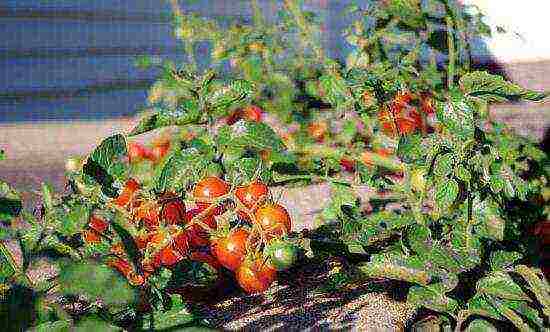 Therefore, this variety is often called creeping. It is very unpretentious, does not need to be attached to the support and the formation of a bush. The only thing that will need to be done is raised ridges so that the creeping side shoots are less in contact with the ground.
Therefore, this variety is often called creeping. It is very unpretentious, does not need to be attached to the support and the formation of a bush. The only thing that will need to be done is raised ridges so that the creeping side shoots are less in contact with the ground.
The Mongolian dwarf tomato gives a high yield of excellent quality. Each tomato weighs 100-200 grams, bright scarlet, spherical, without ribs. Tomatoes are universal in their purpose: they can be eaten fresh, used for cooking any dishes, and can also be preserved. The advantages of the variety are ease of care, non-capricious "character", high fertility and endurance to low temperatures. Good taste of fruits, their versatility, keeping quality and transportability are also considered to be the advantages of the Mongolian dwarf tomato.
Early among early
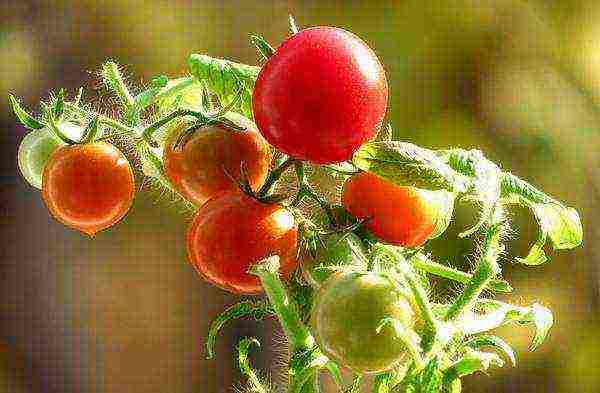 In terms of ripening, tomatoes for greenhouses are greenhouse varieties of tomatoes, early ripening, mid-ripening or late-ripening. When choosing varieties according to this criterion, a novice gardener is faced with a dilemma: what are the best varieties of tomatoes for greenhouses to choose - early ripening, medium or late?
In terms of ripening, tomatoes for greenhouses are greenhouse varieties of tomatoes, early ripening, mid-ripening or late-ripening. When choosing varieties according to this criterion, a novice gardener is faced with a dilemma: what are the best varieties of tomatoes for greenhouses to choose - early ripening, medium or late?
For Russian climatic conditions, it is better to choose tomatoes with an early yield. Such tomatoes grow faster, which means that the chances are increased that they will have time to reveal their full potential and form a high-quality harvest. In addition, early varieties of tomatoes for greenhouses have time to produce fruits before all diseases and pests begin to "press on" the plants en masse, which also affects the fertility indicators.
The earliest tomatoes are a guarantee of the harvest
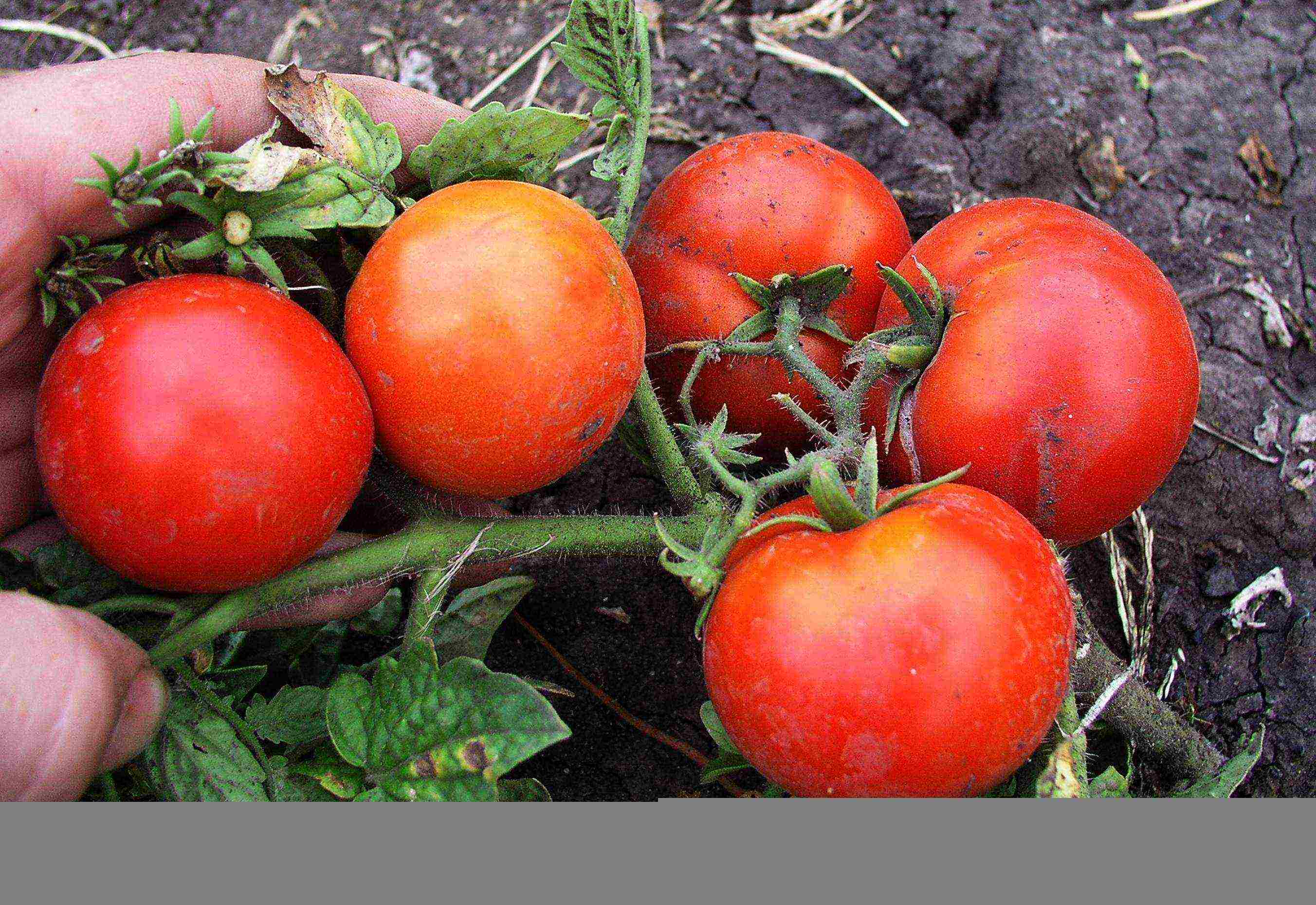 As a rule, super early varieties of tomatoes for greenhouses yield a harvest three months after the first leaves of seedlings emerge from the soil. Recently, the earliest varieties of tomatoes have begun to appear, with a growing season of only 70 days. Such super-early varieties of tomatoes received a positive assessment: Arktika, Boni M, Pygmy, Karbo.Hybrids of super early yields that give excellent results when grown in sheltered ridges - Aurora, Biathlon, Debut, Dolphin, Yesenia, Rosan.
As a rule, super early varieties of tomatoes for greenhouses yield a harvest three months after the first leaves of seedlings emerge from the soil. Recently, the earliest varieties of tomatoes have begun to appear, with a growing season of only 70 days. Such super-early varieties of tomatoes received a positive assessment: Arktika, Boni M, Pygmy, Karbo.Hybrids of super early yields that give excellent results when grown in sheltered ridges - Aurora, Biathlon, Debut, Dolphin, Yesenia, Rosan.
One of the most beloved varieties of ultra-early ripening is the Labrador tomato.
Tomato variety Labrador
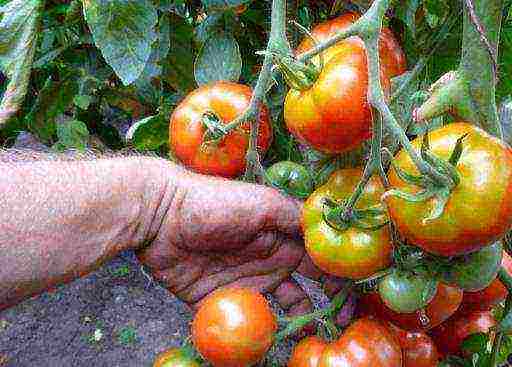 This variety is distinguished by increased early maturity of fruits. Begins to bear fruit at the end of June, subject to sowing seeds to obtain seedlings at the end of March - in the first decade of April. The tight timing of fruit ripening makes it possible to avoid late blight. The bush is determinant, reaching a height of 50-60 centimeters. It is easy to care for, does not require a garter, without pinching. The yields are good. Fruiting is long and abundant. Fruit sizes are medium (80-150 gr). The shape is round-flattened, the color is bright red. Suitable for all gastronomic purposes, including salting and canning.
This variety is distinguished by increased early maturity of fruits. Begins to bear fruit at the end of June, subject to sowing seeds to obtain seedlings at the end of March - in the first decade of April. The tight timing of fruit ripening makes it possible to avoid late blight. The bush is determinant, reaching a height of 50-60 centimeters. It is easy to care for, does not require a garter, without pinching. The yields are good. Fruiting is long and abundant. Fruit sizes are medium (80-150 gr). The shape is round-flattened, the color is bright red. Suitable for all gastronomic purposes, including salting and canning.
Salad and sweet varieties of tomatoes
If the choice of tomato is made according to its taste, then here too the breeders have tried and brought out sweet varieties of tomatoes for the greenhouse, which have no equal in terms of sweetness and juiciness of fruits.
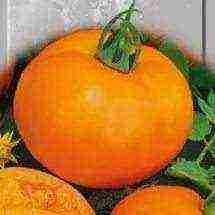 These tomatoes are intended to be eaten fresh or juiced. The main requirement put forward to them is the sweetness and juiciness of the pulp, reduced "boneiness".
These tomatoes are intended to be eaten fresh or juiced. The main requirement put forward to them is the sweetness and juiciness of the pulp, reduced "boneiness".
Sweet, practically non-sour tomatoes, highly appreciated for their great taste and aroma, are represented by the following varieties: Orange, Alpinog, Bull's Heart, Dina, Raspberry Giant, Cardinal, Bear in the North, Honey Spas, Pink Elephant, Pink Giant, Pink Flamingo F1 , F1 handbag, F1 Samara, Tsifomandra.
If we talk about cherry tomatoes, so beloved for their small, colorful mini-fruits, then among them there are also tomato crumbs with a honey flavor. Such small, colorful and sweetest tomatoes are very fond of children. They look extremely decorative on a bush, and they have no equal in the quality of the "design" of dishes. Cherry tomatoes with unusually sweet pulp include such varieties as: Sugar Plum, Cherry Blossam F1, Yellow Cherry, Sweet Bunch, Honey Drop, Salute.
Yellow cherry - fruit tomato
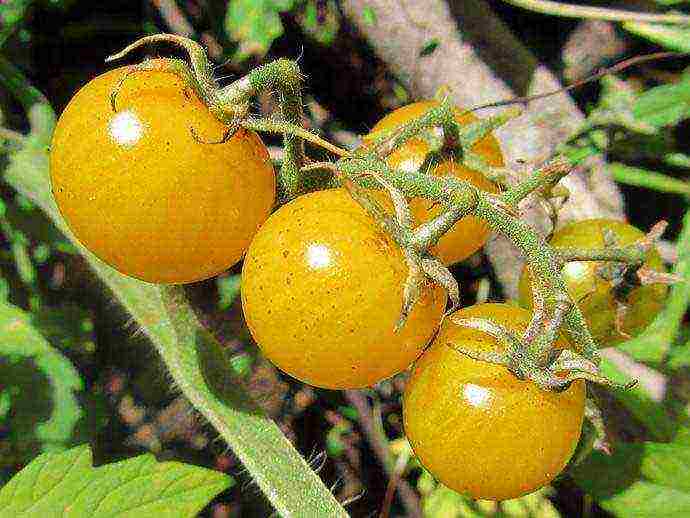 The very sweet pulp of Yellow Cherry tomatoes approaches fruit in taste. Small, bright, yellow ball fruits grow on a cluster of 50-60 pieces. One crumb tomato weighs only 15-20 grams, but thanks to the lush bunches, such tomatoes yield a very plentiful harvest - about four kilograms per bush. Such bushes look very beautiful. This hybrid belongs to the indeterminate varieties, the average plant height is 1.5 m. It is characterized by an extremely early yield - the growing season lasts about 80 days. Tomato variety Yellow cherry can be grown in both sheltered and uncovered beds. The disadvantages of the variety include not very high resistance to such "tomato troubles" as tobacco mosaic and fusarium. Therefore, special attention should be paid to the treatment of plants against diseases. Another "minus" of the variety - the fruits are not suitable for long-term storage. But this inconvenience is offset by the fact that they can be preserved. Yellow cherry tomatoes will decorate any jar, especially when they become a part of the pickled assortment “Summer in a Jar”.
The very sweet pulp of Yellow Cherry tomatoes approaches fruit in taste. Small, bright, yellow ball fruits grow on a cluster of 50-60 pieces. One crumb tomato weighs only 15-20 grams, but thanks to the lush bunches, such tomatoes yield a very plentiful harvest - about four kilograms per bush. Such bushes look very beautiful. This hybrid belongs to the indeterminate varieties, the average plant height is 1.5 m. It is characterized by an extremely early yield - the growing season lasts about 80 days. Tomato variety Yellow cherry can be grown in both sheltered and uncovered beds. The disadvantages of the variety include not very high resistance to such "tomato troubles" as tobacco mosaic and fusarium. Therefore, special attention should be paid to the treatment of plants against diseases. Another "minus" of the variety - the fruits are not suitable for long-term storage. But this inconvenience is offset by the fact that they can be preserved. Yellow cherry tomatoes will decorate any jar, especially when they become a part of the pickled assortment “Summer in a Jar”.
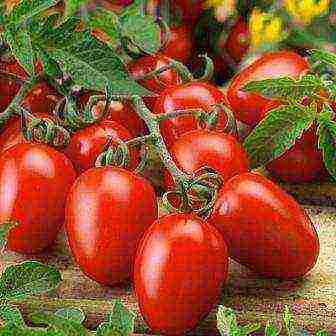 To obtain a high-quality harvest of certain vegetables, it is important to choose the right variety, tomatoes are no exception. Currently, you can buy any tomato seeds on the market, but choosing the most suitable option is often extremely problematic. Now you can easily find red, pink, yellow, black and even green tomatoes, and various varieties can be both short and suitable for growing in the open field, and tall and intended for sowing in a greenhouse.
To obtain a high-quality harvest of certain vegetables, it is important to choose the right variety, tomatoes are no exception. Currently, you can buy any tomato seeds on the market, but choosing the most suitable option is often extremely problematic. Now you can easily find red, pink, yellow, black and even green tomatoes, and various varieties can be both short and suitable for growing in the open field, and tall and intended for sowing in a greenhouse.
Seed selection criteria and rules
Tomato seeds that are on the market are often a real miracle of biotechnology, since some of them are resistant to the most dangerous fungal diseases, others allow you to get beautiful fruits of various shapes, weighing about 1 kg.When choosing a tomato variety for planting on an existing personal plot, it is very important to consider what the resulting crop will be used for.
For intact blockages, it is best to choose small-fruited species, such as cherry. In order to make tomatoes in jars look even more spectacular, you can alternate their different colors, for example, first put red fruits, and then yellow or green tomatoes.
In addition, these tomatoes are perfect for making spicy pickled tomatoes "Armenianchiki". This option will be the perfect addition to any meal. If you plan to make juice or paste from tomatoes, it is best to choose a large-fruited tomato variety, since its fruits will differ not only in large mass, but also in meatiness.

When choosing seeds, many gardeners pay attention exclusively to tomato varieties with photos and descriptions, but they do not take into account whether tomatoes will be grown in a greenhouse, open field or on a windowsill, as well as climatic conditions and soil composition in a particular area. Despite the fact that reviews about a particular type of tomato may be the most positive, it is very important to pay attention to all the features of the type of tomato.
Low-growing varieties of tomatoes for growing in the open field
Given that most gardeners grow tomatoes outdoors, you should first determine the best tomato varieties intended for growing without additional cover. Photos describing the varieties that have received the best reviews from avid gardeners are extremely diverse. Usually in the open field, medium-early, medium-late and late varieties of tomatoes are grown.
To obtain a high-quality harvest, hybrid types of tomatoes can also be used, which are distinguished by their short and medium height. In this case, the height of the bush can vary from 50 to 110 cm, which greatly facilitates planting, tying and growing in the open field.
Small-fruited and large-fruited varieties of tomatoes with bushes reaching 40-70 cm include:
- Robin. This variety of tomatoes has a high yield, and the bushes reach no more than 60-70 cm, which is extremely convenient for growing in the open field. The fruits are characterized by a raspberry hue, oblong shape and reach 60-80 g. They are suitable for clogging whole. It is this variety that is often used for the preparation of such a dish as “Armenianchik” pickled tomatoes.
- Mustang. One of the most fertile types of tomatoes. The fruits reach 150-300 g, have a bright red color and are distinguished by significant juiciness, therefore they are ideal for making juices and pastes.
- White filling. Differs in high productivity and belongs to the category of early maturing. Usually the bushes reach no more than 40-50 cm in height and bear fruit with a large number of red fruits. The fruits are great for preservation.
- Apparently invisible. The fruits of plants can reach 300 g and are distinguished by a rounded shape and a pink tint. Planting can be carried out immediately with seeds.
- Watercolor. The fruits reach 100 g, while the plants themselves are rarely taller than 50 cm.

Low-growing varieties that are suitable for outdoor cultivation also include:
- Knight;
- Pink honey;
- High color;
- Maroussia;
- Samson;
- Liang;
- Ballerina;
- Lady fingers;
- Siberian trump card;
- Sensei.
These are not all good low-growing varieties of tomatoes that do not require additional care and careful tying to prevent contact of ripening fruits with the soil and pests that may inhabit it.
Medium-sized varieties of tomatoes for open ground
If the garden plot is large enough and it is possible to plant plants in beds with wide aisles, you can pay attention to tomato varieties with a height of 70 to 120 cm.
The following best varieties of tomatoes belonging to this category can be noted:
- Andromeda;
- Supermodel;
- Labrador;
- Salted delicacy;
- Fun;
- Beginner;
- Mikado;
- Aurora.
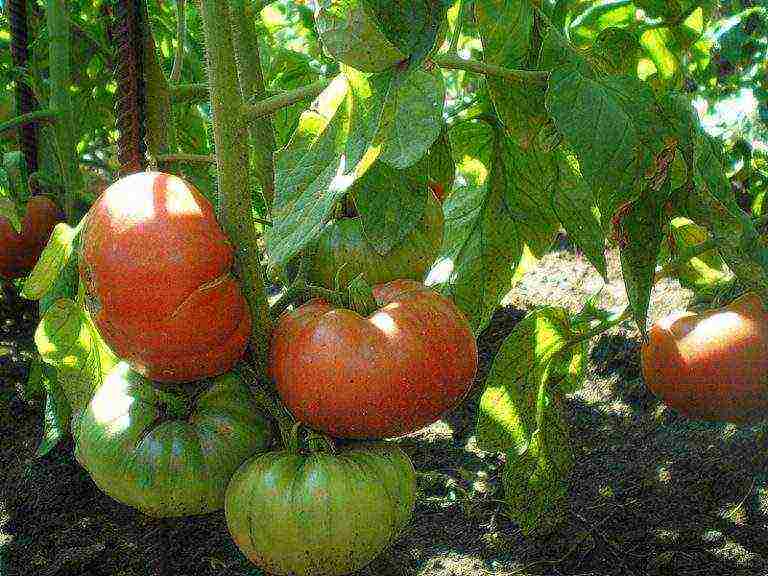
These varieties are distinguished by increased yields, but at the same time, the length of the stem requires the arrangement of additional supports, since if the plants creep along the ground, this can cause damage to the forming fruits by slugs or fungal diseases.
Varieties that differ in the original color and shape of the fruit
The best varieties of tomatoes for open ground can differ in different shapes and sizes of fruits, which allows you to choose the best option for any type of further conservation.
When choosing tomato seeds when you plan to plant them in open ground, you can pay attention to the following best varieties of tomatoes:
- Kemerovets. This good variety is characterized by the pink color of ripe fruits, and the outwardly tomatoes are small and look like hearts. The fruits are perfect for marinade according to the recipe "Armenianchiki".
- El Dorado. Tomatoes are distinguished by an even rounded shape and rich yellow color. Tomato fruits are thick, dense and can reach about 250 g.
- Golden stream. The fruits have an oblong shape and reach 100 g. The color of ripe fruits is rich orange, and unripe tomatoes, as a rule, have a white tint.
- Golden autumn. Ripe tomatoes are bright orange in color and have a rich taste. More than 5 tomatoes can form on a bunch at once. Fruits usually reach 80 g. Planting can be done by seeds.
- Mazarin. Bushes usually reach 1.2 m in height and require a garter. Fruits can reach from 150 to 800 g. The tomato is thick and very juicy. The peculiarities of the variety are the original shape and color of the fruit, which, as a rule, are heart-shaped and burgundy.
- Burned. This variety is characterized by bright yellow oblong fruits that can reach 15 cm in length. The height of the plant itself usually does not exceed 45 cm, it grows in the form of a bush. Usually the fruits are used for conservation.
- Gold queen. A distinctive feature of the variety is the yellow color of the fruits, which reach about 300 g. The fruits of the tomato are thick and very juicy.
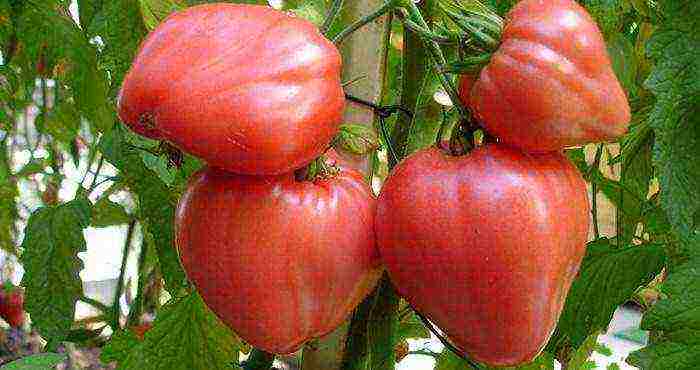
Thanks to the development of biotechnology, there are also tall varieties that differ in the original color of ripe fruits (even green tomatoes were bred) and in various forms, but they are more often used for sowing in greenhouses, since they require the creation of optimal conditions for their growth and the arrangement of reliable supports.
Greenhouse varieties
In greenhouse conditions, tall varieties are planted, which are distinguished by increased productivity. What are the best tomato seeds for planting in a greenhouse complex? The following are recommended for planting:
- Carlson;
- Mushroom basket;
- Midas;
- Pink king;
- Madam;
- Honey rescued;
- Tortilla;
- Academician Sakharov;
- Orange miracle;
- Bull heart;
- Vologda F1;
- Bohemia F1;
- Opera F1;
- Gold bead F1;
- Cardinal;
- Darnitsa F1;
- The cherry is pink;
- Arctic;
- Red drop;
- Count Orlov;
- Caprice F1;
- Amber drop;
- Flame sparks;
- Dessert;
- White currant;
- Cherry is black.
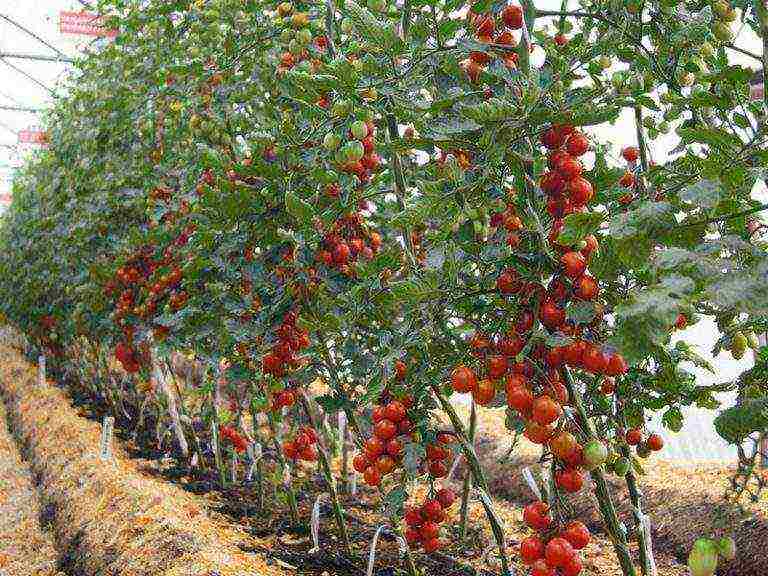
Given that there are a large number of seeds from different manufacturers on the market, it is very important to check before buying whether there are marks on them indicating the quality and the checks carried out, this is the only way to select the best option for planting.
The best varieties of tomatoes (video)
Disease Resistant Tomatoes
When choosing a good tomato variety for planting on an existing plot, it is very important to consider whether there have been cases of tomato disease on it, it is better to choose resistant species. Tomato varieties were bred that are not susceptible to many dangerous viral and fungal diseases.These include:
- Butuz;
- Salting miracle;
- Samson;
- Katyusha F1;
- Raspberry Miracle;
- Budenovka.
Planting varieties resistant to late blight and other diseases allows you to protect the future harvest from various pathogenic microorganisms.
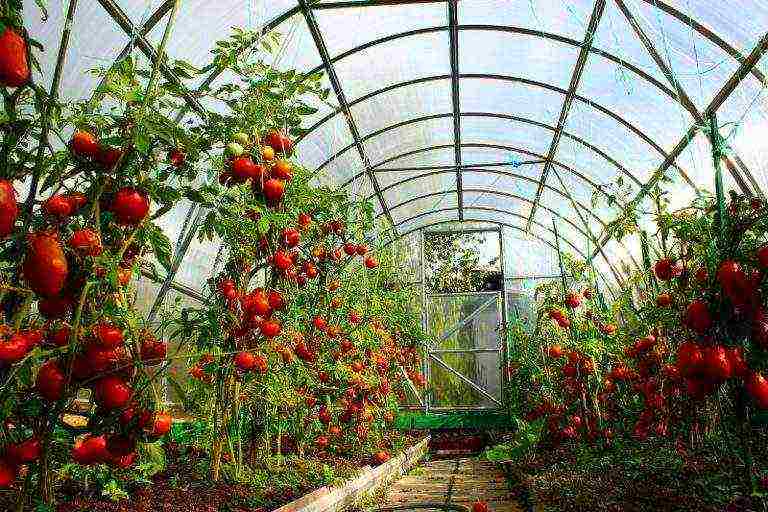
It is worth noting that planting resistant tomatoes is the most acceptable measure if cases of fungal or viral diseases of tomatoes have been identified on the site.
Gallery: tomatoes for open ground and greenhouses (15 photos)
Tomato varieties and hybrids are so diverse that even an experienced vegetable grower sometimes finds it difficult to choose. Of course, everyone has their own priorities - someone loves large and fleshy tomatoes, someone prefers small but sweet ones, and someone is forced to select a variety taking into account the climate of their region. But in any case, every gardener tries to choose the most productive varieties of tomatoes for the garden, which also have excellent taste.
How to choose a variety
When choosing a tomato variety, it is necessary to take into account many factors that affect the yield of a vegetable crop. Firstly, you need to decide in advance on the place where vegetables will be planted, and purchase seeds, taking into account the growing conditions. The process of growing tomatoes in open and protected soil has significant differences - even the highest-yielding varieties of tomatoes for beds will not give high-quality fruits when planted in a greenhouse. Conversely, greenhouse varieties will not give the expected yield when grown in the garden.
When purchasing tomato seeds, you should take into account the taste properties of each specific variety. Some tomatoes express their taste better immediately after removal from the bush, others reveal it after salting or preservation, and some are very tasty in an unripe form, while when ripe they have a very ordinary and primitive taste.
It is also important to decide on the question - what tomatoes will be grown for what? If for salting, then you should give preference to medium-sized fruits with sweet dense pulp. If for conservation, then it is better to choose small fruits with a dense, non-bursting skin. The choice of salad varieties is endless - these are tomatoes of various shapes, colors and tastes. They are not suitable for blanks, but they have a very fleshy structure and excellent taste.
Yield also depends to some extent on the shape and size of the bush. Low-growing varieties are less demanding to care for, but fewer fruits grow on them. It is possible to increase the yield of such species only at the expense of a large number of beds. Tall varieties need tying and installation of supports, but you can also get a higher yield from them. In addition, tall plants save floor space.
When choosing fruitful varieties of tomatoes for open ground, it will be useful to take into account the period of their ripening. If you want to have fresh homemade tomatoes on the table from early spring to winter, you will have to plant many different varieties with different ripening periods. Well, the most important factor affecting yield is climate adaptability. It is important to understand which varieties of tomatoes can grow in a particular climate. So intended for the southern regions, it is very difficult to grow in the northern latitudes - at best, the yield will be minimal, and at worst, the plants will not be able to develop due to the cold, and the yield will be zero. Therefore, for the northern regions, it is better to choose Siberian tomatoes, bred specifically for cold climates.
Video "Overview of many varieties of tomatoes"
Video review of popular fruit tomatoes.
The best tomatoes
Tomatoes can be classified according to different parameters:
By yield
High-yielding varieties of tomatoes are those from which you can collect 5 or more kilograms of vegetables from one square meter of planting. It should be said that many recently bred Dutch varieties, as well as similar domestic breeding, are capable of producing up to 20 kg per 1 m of planting, but these hybrids are grown mainly in greenhouses for commercial purposes.For a high yield tomato from open ground, it is better to plant varieties designed specifically for these conditions:
- Waterfall - a tall tomato of early ripening with dense oblong fruits of a bright orange color, with proper care, it can yield a yield of 6-8 kg;
- Anastasia is a tall (100-130 cm) mid-season variety with bright red, sometimes burgundy fruits of medium size (170-200 g), when the necessary conditions are created, up to 12 kg of the crop can be harvested;
- Raspberry giant is an early variety with very large (up to 500 g) pink fruits, due to which high yields are obtained, resistant to diseases and pests;
- Nastena F1 is an early ripe tall (120-150 cm) hybrid with large (up to 300 g) red fleshy fruits, tolerates low temperatures and high humidity well, is resistant to diseases, very high-yielding - 16-18 kg per 1 meter of planting;
- Diabolic - compact and fairly tall bushes (100-120 cm) with red oblong fruits weighing (120-140 g), tomatoes are perfectly transported, suitable for harvesting, not susceptible to diseases, when grown for industrial purposes yield a yield of 400-600 centners per hectare of area.
Experienced vegetable growers admit that extremely fruitful tomato varieties do not have high taste and aroma. This is due to the fact that all the forces of such plants are aimed at the formation of multiple fruits, and not at the concentration of sugars and nutrient fibers.
By type of bush
According to the height of the bush, tomatoes are divided into:
- determinant (undersized) - their height is 50-100 cm, they do not need to remove excess shoots and tie;
- and indeterminate (tall) - bushes of such tomatoes can grow up to 2 meters, often require the installation of supports and correction of the bush, in turn are subdivided into standard species (with strong compact bushes) and non-standard (with thin stems prone to lodging and needing in supports);
- there are also medium-sized tomatoes, the height of which varies in the range of 80-110 cm.
The most productive and undersized varieties:
- Sanka is an ultra-early hybrid variety with compact bushes (30-40 cm) and round red fruits;
- Rio Grande - a high-yielding tomato with powerful bushes up to 60 cm high, fruits are even, elongated, medium-sized (100-120 g), universal - suitable for canning and processing;
- Bagheera F1 is an early undersized hybrid with large (180-220 g) fruits suitable for any processing and transportation.
Among the tomatoes of an average ripening period, one can distinguish the high-yielding tomato "Volgogradskiy 5/95". This is a standard plant 70-120 cm high with smooth red fruits weighing 80-150 g. Fruits are well transported and stored for a long time. Of the tall, fruitful tomatoes, the following can be distinguished:
- De Barao - this variety has many hybrids that differ in shape and color, but this variety of tomato unites the invariable sweet taste of fleshy fruits, reaching a weight of 300-400 g, in which there are practically no seeds;
- Tarasenko 2 is a hybrid of late ripening, stems are high (up to 2 m) with multiple clusters, on which there are many small (30-40 g) fruits with a total weight of up to 3 kg.
Many vegetable growers prefer standard types of tomatoes, since they do not need tying and are less demanding to care for.
To size
By the size of the fruit, tomatoes are divided into large (300-400 g), very large (up to 700-1000 g), medium, small, and very small - "cherry". Large-fruited varieties are:
- Miracle of the Earth - the fruits are elongated, heart-shaped, reaching a weight of 400-500 g, have a dense sweetish pulp;
- Andreevsky surprise - tall (up to 2 m) salad variety with very large (400-700 g) fruits, tomato color - raspberry, pulp is fleshy and juicy, seeds are practically absent;
- Bovine heart - a tomato of the middle ripening period with very large (400-600 g) fruits with dense sweetish pulp;
- Raspberry giant - fruits are large (600-800 g), flattened, with tender pulp, seeds are almost absent.
Small varieties include the following:
- Wonder of the world - small fruits resembling lemon in shape and color, the mass of tomatoes is 50-100 g, up to 50 pieces can be collected from one bush;
- Black Moor is a mid-season hybrid with small brownish fruits weighing 30-50 g, suitable for conservation;
- Tarasenko 2 - tall bushes with heavy clusters, each of which ripens more than 35 small (50-60 g) fruits.
Ornamental varieties of miniature tomatoes, known to us as "cherry", have high taste properties. These tomatoes are successfully grown both in the garden and in pots on the balconies. Among the most popular are: Noon, Green Pearl, Lemon (yellow), Amber, Honey Drop.
By sustainability
When it comes to the resilience of the tomato, most often it is not disease that is meant, but endurance in low temperatures. What kind of tomatoes can be grown in cold climates - this question is of most interest to residents of the northern regions. For such regions, you should choose varieties of Siberian selection, the seeds of which are adapted to these conditions.
The following varieties of tomatoes are hardy:
- The shuttle is a frost-resistant variety of Siberian selection, it is not afraid of pests, diseases and transportation, ripens in 80-100 days, the fruits are small (up to 60 g);
- Bakery plants - large-fruited (300-500 g) tomato, low bush - up to 80 cm, resistant to temperature changes;
- Destructive force - a high-yielding hybrid of Siberian selection, the fruits are medium (up to 150 g), unpretentious in care, even at low temperatures yields a yield of 5-6 kg;
- Triumphant - mid-season standard grade of Siberian selection, undersized bushes (40-50 cm), small fruits - up to 100g;
- The Snow Tale is a unique hybrid of Siberian selection, the bush of which is literally covered with small fruits, and the stems do not need to be tied up.
There are also several varieties that Ukraine has bred, but these seeds are also adapted to the conditions of the north or middle zone: Priusadebny, Gospodar, Sonyachne Kolo and others.
By the duration of ripening
According to the ripening period, tomatoes are early-ripening, mid-ripening and late-ripening, but recently many hybrids have been bred, which are called "early".Tomato varieties are called early maturing, the ripening period of which is up to 100 days. These include: Dubok, White filling, Alpha, Amur shtamb, Valentina, Don Juan - the ripening period of these varieties is 95-98 days.
Mid-season tomatoes are those that reach their full maturity in 105-115 days: Pink Elephant, Hybrid 35, Volgograd, Gigant 5, Akulina, Tsarevna and many others. It should be said that most tomatoes are mid-season, and when choosing seeds, gardeners often come across just such varieties. Tomatoes are considered late ripening, for which ripening takes from 117 to 130 days. These include: De Barao, Wonder of the World, Titanium, Brown Sugar and others. Late types of tomatoes are not very popular, but unlike early ones, they are stored longer.
The most popular varieties are the early ones, the ripening period of which is sometimes limited to 70 days. The seeds of these tomatoes are adapted to low temperatures and tolerate even slight frosts perfectly. These include: Sanka, Far North, Little Red Riding Hood, Nevsky and many others.
By storage time
Only certain varieties of tomatoes can be preserved for a long time, in which there is a special gene that inhibits the ripening of fruits. As a rule, these are late-ripening hybrids, bred specifically for the purpose of preservation. These tomatoes are harvested at the initial stage of ripeness (when they are just beginning to turn brown), and their full maturity occurs later at a temperature of 18 ° C.
These hybrids are:
- Radical, Lazar, Dominator - the fruits of these varieties are stored for more than 1 month;
- Khutorskoy pickling, Giraffe - fruits are stored for up to 4 months;
- Long Keeper, Lezhebok, New Year's - perfectly retain their taste until the New Year.
It is fair to say that long-stored hybrids have a fairly dense skin and not very pronounced taste and aroma, since their ripening occurs under artificial conditions. But, in spite of everything, this is the only way to get fresh homemade tomatoes in winter.
Video "A selection of the most popular varieties"
A video selection of the most popular tomatoes, which will help you make the right choice.


